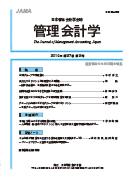Volume 27, Issue 2
Displaying 1-7 of 7 articles from this issue
- |<
- <
- 1
- >
- >|
Invited Articles
-
2019 Volume 27 Issue 2 Pages 3-11
Published: March 31, 2019
Released on J-STAGE: May 15, 2019
Download PDF (311K) -
2019 Volume 27 Issue 2 Pages 13-26
Published: March 31, 2019
Released on J-STAGE: May 15, 2019
Download PDF (2043K) -
2019 Volume 27 Issue 2 Pages 27-44
Published: March 31, 2019
Released on J-STAGE: May 15, 2019
Download PDF (671K) -
2019 Volume 27 Issue 2 Pages 45-60
Published: March 31, 2019
Released on J-STAGE: May 15, 2019
Download PDF (1298K) -
2019 Volume 27 Issue 2 Pages 61-72
Published: March 31, 2019
Released on J-STAGE: May 15, 2019
Download PDF (874K)
Case Research
-
2019 Volume 27 Issue 2 Pages 73-81
Published: March 31, 2019
Released on J-STAGE: May 15, 2019
Download PDF (592K)
Study Note
-
2019 Volume 27 Issue 2 Pages 83-98
Published: March 31, 2019
Released on J-STAGE: May 15, 2019
Download PDF (1485K)
- |<
- <
- 1
- >
- >|
